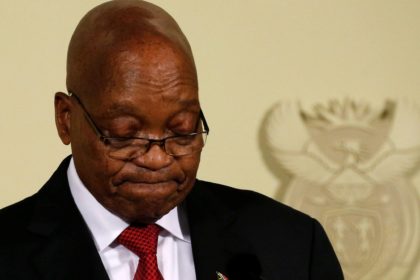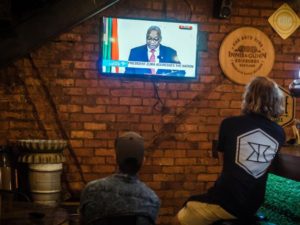
President Jacob Zuma has resigned. After more than ten days of uncertainty in South Africa, Zuma took to an official podium in the capital Pretoria and in a televised address late on Wednesday night (Feb. 14) local night, he told the nation he was finally stepping down after being pushed out by his own Party.
JACOB Zuma has resigned as president of South Africa, bringing an end to his nine scandal-plagued years in power.
In a 30-minute farewell address to the nation, 75-year-old Zuma slammed the way his African National Congress (ANC) party had shoved him towards an early exit, after the election of Cyril Ramaphosa as party president in December.
But he admitted defeat and said he would accept the orders.
“I have therefore come to the decision to resign as president of the republic with immediate effect,” Zuma said.
“Even though I disagree with the decision of the leadership of my organisation, I have always been a disciplined member of the ANC.
“The ruling party had said it would vote him out on Thursday. No life should be lost in my name. And also the ANC should not be divided in my name.”
The ANC ordered him to step down as president on Tuesday.
When he failed to resign on Wednesday, it announced that it would back an opposition motion in parliament to force him out.
His resignation ends the career of the former anti-apartheid resistance fighter, who has four wives, a sharp tongue and a decades-long history of entanglement in scandals.
The rand currency soared more than one per cent to a 2-1/2 year high of 11.79 against the dollar during the day.
It ends a controversial and turbulent period in the country’s political history.
Zuma, 75, has been in power since 2009 and faced numerous allegations of corruption.
Here are five of his biggest scandals:

South African President Jacob Zuma finally forced to stand down
RAPE CHARGES AND HIV
Before taking office, Zuma was put on trial in 2006 for rape, in a case that dismayed many South Africans.
Zuma said the sex with the 31-year-old family friend was consensual and he was acquitted.
But he told the court he had showered to avoid contracting HIV after having unprotected sex with his HIV-positive accuser — a common but dangerous myth.
Zuma was head of the South African National AIDS Council at the time, and was pilloried for his ignorance.
He is still mocked in newspaper cartoons, which often depict him with a shower nozzle sprouting from his bald head.
Nearly a fifth of South Africans aged between 15 and 49 are HIV-positive.
Smouldering rumours of the family’s undue influence on the president burst into flames in 2016 when evidence emerged they allegedly offered key government jobs to those who might help their business interests.
Ousted deputy finance minister Mcebisi Jonas revealed that the Guptas had offered him a promotion shortly before Zuma sacked respected finance minister Nhlanhla Nene in December 2015.
The opposition Democratic Alliance (DA) laid corruption charges against the Guptas and Zuma’s son Duduzane.
ARMS DEAL
In October 2017, after a marathon legal campaign by the DA party, the Supreme Court of Appeal ruled that Zuma was liable for prosecution over almost 800 counts of corruption relating to a 1990s arms deal.
The accusations relate to a multibillion-dollar arms deal signed in 1999, when Zuma was deputy president. He allegedly accepted bribes from international arms manufacturers to influence the choice of weaponry.
Zuma’s adviser, Schabir Shaik, was jailed for 15 years in 2005. He was released on medical parole in 2009, the year Zuma became president.
After he leaves office, Zuma faces the risk of jail over 18 criminal charges over the 783 payments he received.
OMAR AL-BASHIR
In March 2016 the South African Supreme Court of Appeal upheld a judgment that the failure by Zuma’s government to arrest Sudanese President Omar al-Bashir was illegal.
Despite an arrest warrant from the International Criminal Court on charges of war crimes in the conflict in Darfur, Bashir was allowed to attend a meeting of the African Union in Johannesburg in 2015.
The government said the fact that he was attending the summit as a head of state meant he had immunity, but the court disagreed.
Zuma escaped an impeachment attempt over the issue in parliament in September 2016, when ANC politicians voted overwhelmingly against it.

